Search Images
Browse Content (p. 1603)

Image
Detail of the Coffin of Llady Diefiawet
The surfaces of the coffin of Diefiawet were covered with painted scenes and hieroglyphic texts to assist and protect her passage into the afterlife. Isis and Nephthys, the sisters of Osiris, protect the head and the foot of the mummy, and...
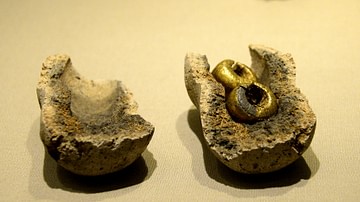
Image
Gold Foil-Covered Lead Bulla from Ancient Ireland
Two small gold foil-covered lead bullae (amulet or pendant), found inside a ceramic vessel, from Annaghbeg or Monasterredan, Co. Sligo, Ireland, c. 800-700 BCE.
National Museum of Ireland-Archaeology, Dublin.
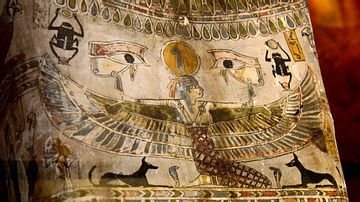
Image
Lady Diefiawet Sarcophagus
The surfaces of the coffin of Diefiawet were covered with painted scenes and hieroglyphic texts to assist and protect her passage into the afterlife. Isis and Nephthys, the sisters of Osiris, protect the head and the foot of the mummy, and...
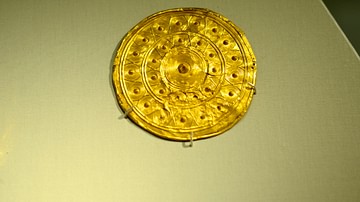
Image
Gold Disc from Ancient Ireland
Gold disc, most likely a terminal of a collar or part of an earspool, from Co. Armagh, Ireland, 800-700 BCE.
National Museum of Ireland-Archaeology, Dublin.
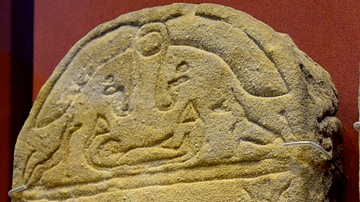
Image
Stela Showing a Deceased Conducted to Osiris
This stela shows that the deceased mummy is being conducted to Osiris by Anubis and Hathor. The inscription below the scene is in Demotic script. From Egypt, precise provenance of excavation is unknown. Ptolemaic period, 305-30 BCE. (National...
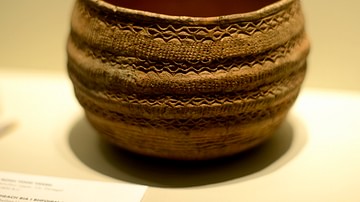
Image
Food Bowl from Ancient Ireland
Bowl found in Bohullion Upper, Co. Donegal, Ireland, c. 1800 BCE.
National Museum of Ireland-Archaeology, Dublin.
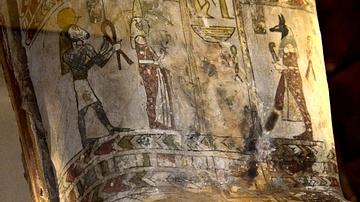
Image
Detail of the Coffin of Lady Diefiawet
The surfaces of the coffin of Diefiawet were covered with painted scenes and hieroglyphic texts to assist and protect her passage into the afterlife. Isis and Nephthys, the sisters of Osiris, protect the head and the foot of the mummy, and...

Image
Carved Stone Head from Corleck Hill, Ireland
Carved stone head (with 3 faces) from Corleck Hill, Co. Cavan, Ireland, 1st-2nd century.
National Museum of Ireland-Archaeology, Dublin.

Image
Gold Foil-covered Lead Bulla from Bog of Allen
This Gold foil-covered lead bulla or amulet was found in Bog of Allen, Ireland. Circa 800-700 BCE. (National Museum of Ireland-Archaeology, Dublin, Republic of Ireland)

Image
Coffin of Diefiawet contaning a Ptelomaic mummy
The mummy is that of an adult female with her arms crossed over the breasts. X-rays have revealed that the body has suffered post-mortum mutilation; both the hands and feet are missing and dummies made of linen have been substituted by the...